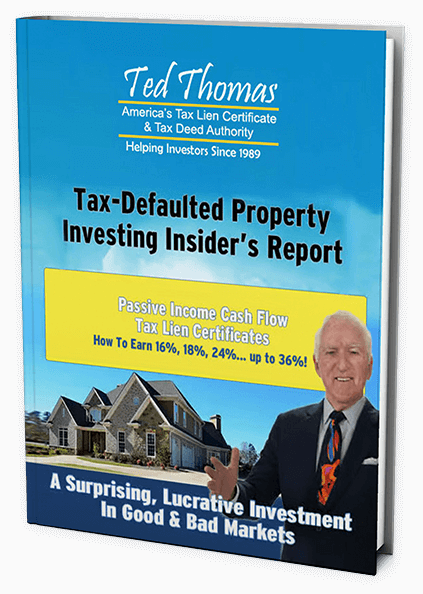Tax deed investing is better than other investments. Why is this such a lucrative investment field? Can anyone do it? Let’s take a look at eight reasons why tax deed investing is better and delivers higher returns than other kinds of investingstrategies.

HIGH RETURN ON INVESTMENT
Tax deed investing is better because it can generate returns from 10 to 90 percent. It delivers those returns in less time than a typical investment takes. Let’s compare that to other investments.
Morningstar keeps a running tally of what the stock market is doing. This article was written in mid-August 2015. Morningstar tracks investments for five years.
If you were an average investor in stocks over those five years, you got a 16.65 percent return on investment. That’s pretty good. Another Morningstar report tracks mutual funds, commodities, bank loans, bonds and other investments. Depending on what you invested in over five years, your investment returned as much as 25.83 percent. That was the highest return, in health sector investments. Other returns varied.
Tax deed investing is better because it can deliver that and more every year.
Debra Murphy is getting a 40 percent annualized return on her investments in tax deeds. Debra is one of the people who signed up for my courses in the member’s only section of my website www.TedThomas.com. Her story is typical of the people who stick with my program and listen to the advice I give. They make high rates of return. Many of them will tell you their investment program has changed their life.
See the difference? You could put your money in typical investments and wait five years. If you were average, you’d make somewhere between 10 -15 percent over those five years. If you invested like Debra did, you made 40 percent each year for those same five years.
Let’s put this in numbers.
You have $100,000.
You invest that in the usual investments. You earn 25 percent over five years.
You make $25,000.
In five years, you have $125,000. You also had to leave your money in those investment accounts for five years.
Take that same $100,000. Invest it in tax deeds and get a 40 percent return by renting the property.
This time you make $200,000 even if you don’t reinvest your profits.
In that same five years, you still have your $100,000 property investment retuning $40,000 a year plus $200,000 in profit, which you could reinvest. This assumes you invested like Debra and keep the houses you bought at a tax deed sale.
Make Your Money Back Quickly
You do not have to leave that money tied up in property for five years.
Take the $100,000 and invest it in tax deeds.
You buy the deeds for 50 percent of fair market value.
You now have $200,000 in property. You sell the property for $180,000 within six months.
You have $80,000 in profits in six months, which you can reinvest. Under this example, you make $160,000 in a year. In five years, you could make $800,000 by only reinvesting your original $100,000. Imagine what would happen if you also reinvested your profits each year.
These are just examples based on what people who have used my investing program have done.
Sales are regularly held around the nation, so you have an opportunity to invest frequently. “Tax Sales are not conducted every month in Williamson County. There are usually 6 to 7 tax sales a year. You may contact the Williamson County Tax Office regarding the date of the next tax sale or consult the website of the law firm of McCreary, Veselka, Bragg and Allen, P.C. (www.mvbalaw.com),” says the Williamson County, TX, website.
You Get to Set Your Own Hours
Shannon Ulrich, from Canada, puts it best. “Now I get to be a grandma and every day is a Saturday.”
Shannon was able to quit her 9-5 job after learning about tax deed investing through me. Her first investment was with her son in a $34,000 tax deed. That was 27 percent of what she thought was the fair market value of the property. Six months after buying the tax deed, she and her son sold the property for $135,000, a profit of $100,000. That was twice her annual salary at the time.
She now makes a living working part-time by investing in tax deeds.
How Does Tax Deed Investing Work?
But how does tax deed investing provide such high returns? First, understand what a tax deed is. Here’s a more detailed explanation of the tax deed. Here’s the short version of the tax deed and tax lien:
• A tax deed gives you immediate rights to the property. There’s no redemption period in a straight tax deed sale. With a tax deed, you own the property after you pay the winning bid and get the deed.
• A tax lien means the property owner has time to redeem the taxes before you can own the property. Redeeming tax liens means the property owner pays you for the back taxes and other added expenses like late fees and interest charged by the tax collector. In the case of a tax lien, you are also earning interest.
The redemption period varies by state. It can be six months to more than a year. For instance, Texas allows six months for a non-homestead property to be redeemed and two years for homesteaded property. Homestead is the place a person calls home. It’s his legal address. Tax liens are redeemed more than 95 percent of the time.
Now, here’s how a tax deed provides healthy returns in a short amount of time.
1) Your money can turn over quickly with a tax deed. After you get the property, sell it. You get your investment money back and a profit. You can reinvest as soon as you find another suitable tax deed. Tax deed sales and tax lien sales are held every month around the nation.
2) You get real estate for a fraction of the fair market value. This means you can sell it or, like Debra, rent it. It’s up to you. Renting provides a long-term income stream, but also means you are responsible for property maintenance, taxes and finding tenants. If you sell the property, take your profits and reinvest in another tax deed sale, possibly in the same community.
When you buy real estate for a fraction of the real value, you can have a profit waiting to be made. You decide what to do with the property. The “Property Selling Strategy Center” section of my website has videos that teach you how to market and sell the property you own when buying a tax deed.
Investing in Real Estate Without Getting a Mortgage
If you have ever tried to buy a house with a bank mortgage, you know the process is long, involved and stressful. Investing in tax deeds cuts the wait and the paperwork. With tax deeds, you don’t have to deal with things like credit checks, title searches and attorney fees. If you have the cash on hand to invest, you don’t need to apply for a loan.
As amazing as it sounds, some incredibly valuable commercial property is occasionally sold in a tax deed auction.
This happened with a Bass Pro Shops megastore in San Antonio, TX. “Commercial Builders Group LLC bid $4.2 million for the 180,000-square-foot Bass Pro Shops building and the 24-acre tract on which it sits at 17907 Interstate 10 West on the Northwest Side. That was significantly less than the appraised value of $19 million,” says the article on My San Antonio, the website for the newspaper The San Antonio Express-News.
Why did this multi-million dollar property go on the auctioneer’s block? Reporter Patrick Danner offers an educated guess: “Stanley Thomas, the Georgia-based developer of The Rim, apparently was willing to let the Bass Pro Shops site go to a tax deed sale because the lease terms weren’t particularly favorable for him, according to Sylvia Romo, Bexar County’s tax assessor-collector.”
See? The property owner decided to not pay the taxes.
Here’s another example from Tampa, FL. This story highlights the success of an investor who buys houses in a tax deed sales for 50 to 75 percent of the cost of the homes. “A 1,900 square-foot pool home in Safety Harbor on an oak-lined street just steps from a waterfront park. Though the house was recently appraised at $380,000, Equialt got it for $148,000,” wrote Susan Taylor Martin, a reporter for Tampa Bay Times.
Want to learn how you can make big profits from bargain real estate? Would you like to buy homes for pennies on the dollar? Or earn double-digit interest rates? Learn how to secure your financial future with this FREE mini class today!
Is Tax Deed Investing Legal?
A lot of people wonder if this is actually legal. It is. The US Supreme Court has ruled several times that local government can seize property to force the payment of property taxes. The most recent case, Jones v. Flowers made this very clear. Chief Justice Roberts wrote, people must pay their property taxes. If they don’t, he said, the government has the right to take that property and sell it to collect the taxes.
The whole decision may be read at FindLaw.com. FindLaw is a website for that presents important legal cases and the decisions to the public. It’s sometimes hard to understand what the judges say in their rulings. The Chicago-Kent College of Law has a quick review of the case that offers more detail.
Where tax deed sales are concerned, you can get a complete explanation on my website.
Believe it or not, some people just don’t pay their taxes. The Bass Pro Shops case is not unique.
Ilyce Glink and Samuel Tamkin talk about this in a report in The Chicago Tribune. “Some homeowners can’t, or won’t, pay their real estate tax bills. It’s in these cases that the tax buyers can end up as owners of these properties.
The sequence of events is as follows: The property owner fails to pay his or her real estate taxes; the local taxing body “sells” the taxes to a tax buyer at a tax auction; a tax buyer pays the municipality the amount of unpaid real estate taxes; the tax buyer receives a document evidencing the tax payment; the property owner gets a fixed amount of time to pay what is owed and redeem the taxes or lose his or her property; the homeowner never shows up to pay the bill; and, finally, the tax buyer receives a tax deed transferring title of the property to the tax buyer.”
Is Investing in Tax Deeds Secure?
Local governments have been holding tax deed sales for decades. They know exactly what to do and how to do it. They have been sued over these sales. They learned from each one of the lawsuits.
However, most of the tax collector websites do carry disclaimers about the sale. The tax collectors’ attorney requires them to have the warning notices. Here’s an example from the Merced County, CA., tax website: “The sale of “tax auctioned” properties should not be equated to real estate sales by licensed salespeople, brokers, or realtors. The Tax Collector cannot guarantee the condition of the property nor assume any responsibility for conformance to codes, permits, or zoning ordinances.
Before tax auctioned property is purchased, it is absolutely necessary that the prospective purchaser (bidder) research records pertaining to the property. Some of the departments and offices to check with are Planning Department, Building Inspector, Environmental Health Department, Recorder’s Office, Assessor’s Office, etc.”
There’s some excellent advice. “…the prospective purchaser (bidder) research records pertaining to the property.” That means due diligence. Check on the property. Find out as much as you can about it. My website has everything you need to know about due diligence and researching property to see if it is a worthwhile investment.
The truth is, this investment is safe and secure when you pay attention to what you are doing. If it were not safe, the state and the federal government would create laws to make it safe. Hicks and Knight, real estate attorneys in Florida, have this to say, “With Tax Deed sales, investors can have confidence that the sale is protected by Florida Statutes.” Local communities must have taxes to operate. By making sure tax deed sales are safe, they guarantee income from tax deed auctions.
Investing in Tax Deeds Isn’t Hard to Learn
You can learn how to successfully and safely invest in tax deeds quickly. You even determine how much you want to learn each day. You decide how fast to go. Any time you need help, call my office and we’ll go over things with you.
My website has tons more information, but here’s a quick primer on tax deed sales.
Tax deeds are sold at public auction by a tax collection agency. Sometimes the tax collector hires a private company to coordinate the sale, but the tax office is still the real agency behind the auction.
Los Angeles County, CA, hires the private firm Bid4Assets.com to conduct its online sales. “After the sale, Bid4Assets will send an email to all winning bidders describing the payment instructions,” states the PDF file.
More and more of these sales are being held online. This means your office can be any room in your house. No more getting up, rushing through breakfast and fighting traffic to get to work. You also set the dress code and the hours you work. The only time you have to pay attention to a clock is when the auction takes place. You have to be online and ready to bid during the auction.
Tax deed investing does take some up-front work. The most important things are:
- Understanding how the sales work
- Understanding what to buy and why
- Finalizing the sale
Let’s briefly look at each one of these.
The Sale
Sales are an auction. Register for the sale. You get details from the tax collector’s office or website. Show up and bid.
San Bernadino County, CA, conducts its sales online, so anyone in the world with an Internet connection can participate in the auction. San Bernadino does require preregistration and a deposit. “A $1,000.00 bid deposit and $35.00 non-refundable processing fee is required of each bidder prior to bidding on any property auction conducted as part of this tax sale. The bid deposit and fee payment shall be made a minimum of five (5) business days before the sale begins,” the website says.
The $1,000 is to show that you are a serious bidder in the auction and can pay for any deed you buy. If you don’t buy anything, you get this money back. The $35 is an administration fee used to set your account up. You don’t get this money back.
Sometimes the deeds don’t sell at auction. Some communities, like Hillsborough County, FL, have over-the-counter tax deed sales. Property that doesn’t sell in the auction is sold first-come, first-served for the minimum amount allowed by law. There’s no bidding on these.
Buying Deeds
You need to look at tax deed sales and carefully examine them. Some questions you need to ask: What shape is the property in? How long will it take to sell it? What can I expect to make in rent? Zillow.com is a website that tracks real estate across the nation. It gives you high- and low-end figures for property based on similar sales in the neighborhood. I have videos on the member’s only section of my website that take you through the Zillow website to explain how to use the information you gather there.
RentOMeter.com is another website that tracks rental property and gives you a good idea of what you could charge a tenant each month. RentOMeter checks rents in a given area based on square miles. It does not tell you about rental rates in a specific neighborhood. Since rent varies widely, based on the immediate area, RentOMeter is good as a rough guide.
My website has a series of videos, “5 Steps to Successfully Researching Properties Online” that walks you through finding and investigating tax deed properties. These explain in detail how to use sites like Zillow, Google Earth and Street View programs. You can watch the videos as often as you need to. Any time you have questions, just call my office and someone will give you the answers you need.
Complete the Sale
Make sure you understand the terms of the sale and how to close the deal. The website for Tarrant County, TX, spells out the sale process in simple language. “Purchasers have up to one hour after the sale to bring in certified funds or cash in the exact amount. There are local banks available nearby should one be needed.” Tarrant County is also an in-person tax deed sale. If you can’t get to that county for the sale, you’ll need to hire someone to act as your agent in the auction.
The LA County tax deed sale sends winning bidders instructions on how to complete the sale.
In short, get the money to the tax office as soon as you can. If possible, pay for your winning bid online and immediately. If you can’t do that, send a certified check by overnight courier or wire the money. Online bidders have “deferred payment option” that gives them time to get their payment sent in to the LA County sale. This is only available for sales over $5,000.
My website has an expanding list of videos and articles that discuss how to navigate sales in various communities across the nation. Some of these videos, like “Huge Profits Waiting for You – 410 Properties Available” for a Riverside, CA, tax sale discuss past sales. These specific auctions may be over, but you can still learn how to navigate the sale process. Riverside will have sales in the future and the auction will be handled in a similar way.
Anyone Can Invest in Tax Deeds
Unlike a lot of things in this world, tax deed investing is better because it doesn’t require years of experience, a professional license, buckets of money or an advanced degree. All it takes is some time, a little bit of training and some money. Bill Beddoes explains how people can buy property for as little as $100 in a series of videos on my website. Other videos explain how to get money to start investing in tax deed sales.
You need five things to get started:
1) A computer. You have to get online to participate in some auctions and investigate properties.
2) Software like Google Earth and a street view kind of program. These let you research the properties. This software is free. My website is packed with tips to help you use your computer for research.
You also need a way to record and track your investments. Most computers are sold with basic business software, which is all you need. Google.com also offers a free suite of easy-to-use office software through GoogleDocs. With this, you can access your records from any place you have an Internet connection.
3) A telephone. You’ll need to call the tax office to verify information, check on the status of your deed and get questions answered. You can also call me when you need help or advice.
4) Some starting capital. You need money to bid in a tax deed auction. You don’t need a lot to start5) Information on how the tax deed auction works. Attorney Eric P. Feichthaler is an expert in Florida real estate law. He wrote a piece for The Cape Coral Daily Breeze about this kind of investing. “[T]ax deeds can be a good investment, but again, it is important you contact legal and financial advisors prior to moving forward.” That’s just his way of saying, learn about the tax deed auction process. Get good, quality information before you start making decisions.
That’s why you are reading this; you want to know more about this kind of investing. That’s why I wrote this. I want to help you realize all your hopes, goals and dreams of a secure financial future. Together, we can do it.
Ted Thomas is a Florida-based author and publisher who specializes in tax defaulted properties. Visitors to his website will find 3 must see FREE instructional videos. No credit card required. The video lessons will give you everything you ever wanted to learn about government tax defaulted real estate which is sold at public auctions for 10 cents to 20 cents on the dollar. You’ll also learn the secrets of tax lien certificates which pay guaranteed returns of 16%, 18%, up to 36%.
Learn how to secure your financial future with this FREE mini class today!




